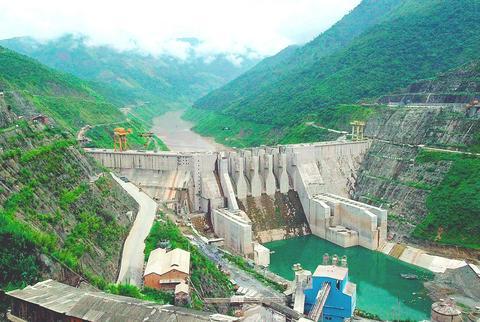Chinese Prime Minister Wen Jiabao (
Wen's intervention signals that China's top leaders have not approved a plan that most dam opponents had considered a fait accompli. His personal involvement is a rare and surprising response in a nondemocratic government that in the past has shown little concern about the environmental effects of major public-works projects.

PHOTO: AP
In written instructions, the news reports said, Wen ordered officials to conduct a major review of the hydropower project, which calls for a 13-stage dam. Environmentalists consider the Nu, which rises in Tibet and flows 2,800km through Yunnan Province between the Mekong and Yangtze rivers, one of the last pristine rivers in Asia. Its upper reaches flow through a canyon region so rich in biodiversity that last year a UN agency declared it a World Heritage Site.
"We should carefully consider and make a scientific decision about major hydroelectric projects like this that have aroused a high level of concern in society, and with which the environmental protection side disagrees," Wen wrote, according to Hong Kong's Ming Pao daily.
The appearance of the announcement in a variety of news outlets suggests that the government wanted to make public Wen's decision. One of the first newspapers to carry the story was Ta Kung Pao, a Hong Kong daily closely allied with Beijing.
Elated environmentalists praised the decision, expressing surprise and hope that the move reflects a growing environmental awareness by the Chinese government. China is widely regarded as one of the world's most polluted countries.
"I was very surprised to hear the news that the prime minister himself sent down an instruction suspending the project," said He Daming (
Environmentalists cautioned, however, that the dam project could still eventually proceed. Construction had been scheduled to begin this year on the first dam at Liuku, near the China-Myanmar border. But Wen's instructions make it clear that environmental objections must be given serious consideration.
"He wants to hear more opinions and gather more views, especially from the conservation side that has been left out," said Qian Jie, deputy director of the Center for Biodiversity and Indigenous Knowledge, an environmental group. "I think at the least it sends a signal that our leaders care about the environment and about social development, and not just about the economy."
The project has been advocated by Yunnan Province officials. They predicted it would provide jobs and raise incomes in one of China's poorest regions. Advocates have also argued that the dams were critical at a time that China is suffering energy shortages.
A Yunnan official reached by telephone said she had heard about Wen's decision but did not know any details.
Opposition to the project by Chinese scientists and environmentalists began coalescing last year. In a surprisingly public rift within the government, the State Environmental Protection Agency, the country's leading environmental agency, announced its opposition to the project. The Chinese Academy of Sciences also warned that the plan could cause enormous damage.
In recent weeks, a consortium of international groups publicly opposed the plan and wrote a formal letter of opposition to President Hu Jintao (

Temperatures in northern Taiwan are forecast to reach as high as 30°C today, as an ongoing northeasterly seasonal wind system weakens, the Central Weather Administration (CWA) said. CWA forecaster Tseng Chao-cheng (曾昭誠) said yesterday that with the seasonal wind system weakening, warmer easterly winds would boost the temperature today. Daytime temperatures in northern Taiwan and Yilan County are expected to range from 28°C to 30°C today, up about 3°C from yesterday, Tseng said. According to the CWA, temperature highs in central and southern Taiwan could stay stable. However, the weather is expected to turn cooler starting tonight as the northeasterly wind system strengthens again

The Ministry of Foreign Affairs (MOFA) yesterday expressed “grave concerns” after Singaporean Prime Minister Lawrence Wong (黃循財) reiterated the city-state’s opposition to “Taiwanese independence” during a meeting with Chinese Premier Li Qiang (李強). In Singapore on Saturday, Wong and Li discussed cross-strait developments, the Singaporean Ministry of Foreign Affairs said in a statement. “Prime Minister Wong reiterated that Singapore has a clear and consistent ‘one China’ policy and is opposed to Taiwan independence,” it said. MOFA responded that it is an objective fact and a common understanding shared by many that the Republic of China (ROC) is an independent, sovereign nation, with world-leading

COOLING OFF: Temperatures are expected to fall to lows of about 20°C on Sunday and possibly 18°C to 19°C next week, following a wave of northeasterly winds on Friday The Central Weather Administration (CWA) on Sunday forecast more rain and cooler temperatures for northern Taiwan this week, with the mercury dropping to lows of 18°C, as another wave of northeasterly winds sweeps across the country. The current northeasterly winds would continue to affect Taiwan through today, with precipitation peaking today, bringing increased rainfall to windward areas, CWA forecaster Liu Pei-teng (劉沛滕) said. The weather system would weaken slightly tomorrow before another, stronger wave arrives on Friday, lasting into next week, Liu said. From yesterday to today, northern Taiwan can expect cool, wet weather, with lows of 22°C to 23°C in most areas,

Taiwan sweltered through its hottest October on record, the Central Weather Administration (CWA) said yesterday, the latest in a string of global temperature records. The main island endured its highest average temperature since 1950, CWA forecaster Liu Pei-teng said. Temperatures the world over have soared in recent years as human-induced climate change contributes to ever more erratic weather patterns. Taiwan’s average temperature was 27.381°C as of Thursday, Liu said. Liu said the average could slip 0.1°C by the end of yesterday, but it would still be higher than the previous record of 27.009°C in 2016. "The temperature only started lowering around Oct. 18 or 19